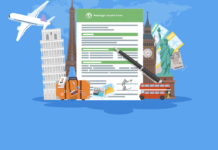There are few things (save bodily harm or a severe bout of food poisoning) that can so effectively ruin a holiday or time abroad as losing your passport.
Whether it’s your own fault and you’ve misplaced or lost it after a boozy night out, or you’ve fallen prey to a pick-pocket or mugger, you can be left feeling stripped of your identity and effectively stranded.
At best, it means a few frantic days of trying to replace it before a flight home.
Despite the somewhat dire seeming outcome, all is not lost. If you’re ever in this predicament while abroad, here’s what you need to do.
Get a police statement.
The first thing to do is report the loss to the local police and get a police statement. If you don’t know where the nearest police station is, your hotel or hostel will be able to get in touch with them for you.
In the place of your passport, a police statement can be invaluable as a form of proof of identity, especially if you were unlucky enough to lose bank cards, money and other statements of identification.
It will also be necessary to have this statement to obtain an emergency passport and, later, to claim on your travel insurance.
Report it to the UK embassy, high commission or consulate of the country you’re in.
For details, call +44 (0)20 7008 1500 from abroad or 0870 606 0290 from the UK.
Alternatively, you can visit the Foreign and Commonwealth Office’s website.
From here, you will be given a Lost or Stolen (LS01) Notification form to complete and sign. This form can also be downloaded should you lose it or need a replacement
The consulate, high commission or embassy will forward on the details of the loss or theft to the IPS, who will cancel the passport, reducing the risk of someone using it.
The Foreign and Commonwealth Office will then issue you with the necessary emergency documents to enable you to travel home.
An emergency replacement passport will cost a small fee. If you find yourself strapped for cash, go to a bank or a Western Union. Money can then be transferred from your account (assuming you have some in there).
Once you have returned to the UK, you should apply for a replacement passport as soon as possible.
If you’re child was included on the passport.
If your child was included on the passport, they can’t be included on the replacement. You’ll need to apply for a separate child’s passport for them.
If you find your passport.
If you’ve already sent off the LS01 form to IPS but then find the missing passport, you will need to send it to IPS. Once they have received the form, they cancel the passport and it can then not be used for travel, identification or any legal purposes.
Similarly, if a third party- for example, the police- find the passport, they will return it to IPS, who will then destroy it for security reasons.
If you find it before you send the LS01 form to IPS, don’t sign the form they send to you. Instead, return it with a signed note confirming that you have found your passport and no longer wish to cancel it.
Find free internet.
When you’re stuck in a foreign country without any of your documents, the internet can be invaluable, especially if you’re travelling alone. From here, you can get in touch with family and friends who may be able to help, or simply download the necessary forms to send to IPS.
If you have money on you, finding an internet café won’t be a problem. However, if your bank cards and cash have gone with your passport, that’s not going to be much good to you.
Public libraries are often your best bet for finding free Wi-Fi. Handily, McDonalds can usually be relied on as a free Wi-Fi hot spot too and finding a restaurant isn’t likely to be a problem, no matter where in the world you are.
Back up your documents
One way to reduce the risk of finding yourself in this situation is to save copies of your passport and important documents.
Saving a copy of your passport to your email account or keeping a paper copy somewhere separate from the original with some spare cash or travellers cheques may well leave you in a much better situation should the worse happen.






